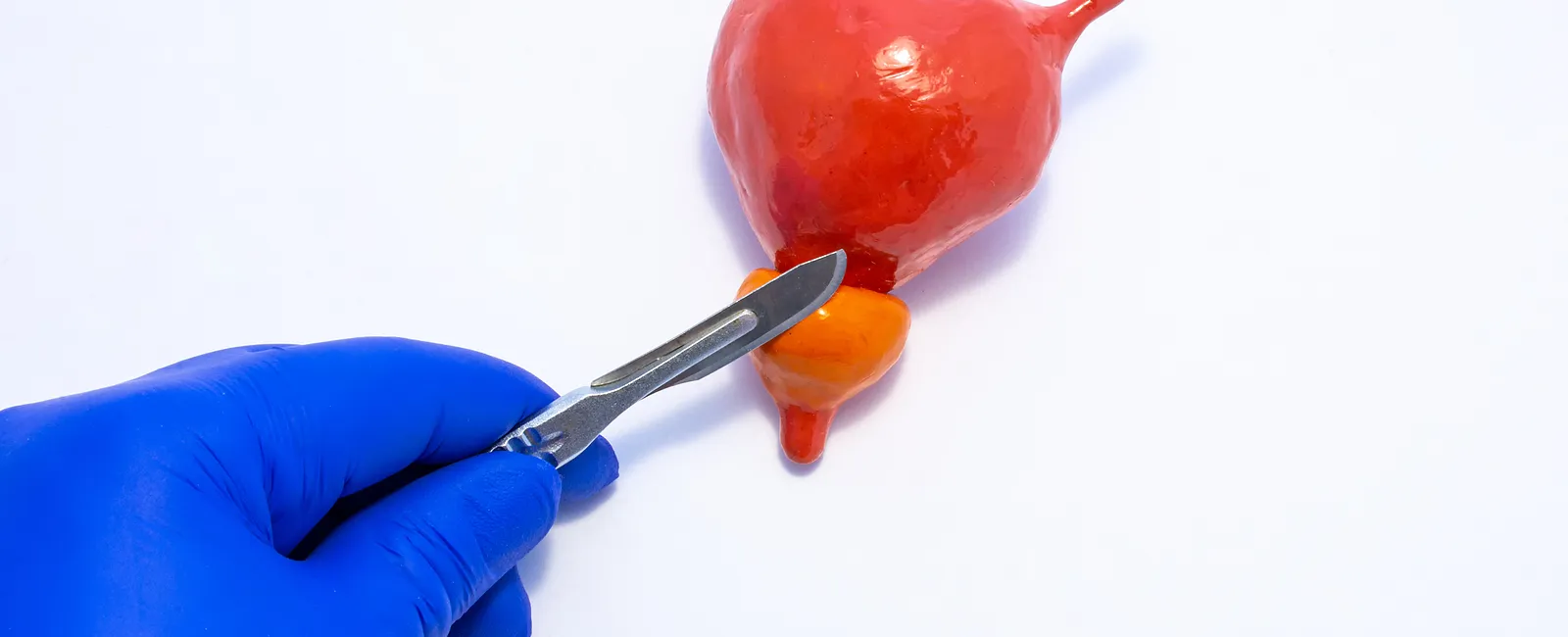One in eight men will be diagnosed with prostate cancer during their lifetime. The prostate gland sits under the bladder and wraps around the urethra (the tube that carries urine from the bladder out of the body). The main function of the prostate gland is reproductive—it helps add nutrients to sperm to promote the fertilization of an egg during conception. A prostatectomy is a surgical procedure to remove part or all of the prostate gland and is a common treatment for prostate cancer.
If you have a prostatectomy scheduled, you may be wondering about quality of life after prostate removal and have questions like, “can you have sex after prostate removal?” We’re sharing what you can expect when recovering from a prostatectomy.
How long is the hospital stay for prostate removal?
After prostate removal, you will likely stay in the hospital for at least one day. You will return home with a urinary catheter which will remain in place for seven to 10 days after surgery. At a follow-up appointment, your catheter will be removed, and you can begin a gradual return to activities. During your recovery from prostate removal, you may experience some side effects.
What are the side effects of prostate removal?
All surgical procedures have some risk of side effects. Not every person experiences the same side effects or severity of symptoms. Common side effects of prostate removal include:
- Erectile dysfunction – The most common side effect of prostate removal is erectile dysfunction, which is when the penis fails to become or stay erect during sexual activity. Your doctor will develop a surgical plan to try to spare as many nerves as possible and preserve your ability to have an erection. If you do experience erectile dysfunction after prostatectomy, there are many effective treatments available to help you still achieve erections and have a satisfying sex life.
- Incontinence – A small percentage of men who have a prostatectomy experience damage to the nerves and muscles of the urethra, bladder, or sphincter (which holds and releases urine in the bladder). When these nerves are damaged, it can result in the involuntary loss of bladder control, known as incontinence. The degree of incontinence varies from man to man and can range from light dribbling to the full loss of bladder control. Incontinence after prostate removal is not a long-term side effect and most men experience lessening stages of incontinence after a prostatectomy, and no longer experience incontinence six months to one year after surgery. If you still suffer from incontinence a year after a prostatectomy, there are treatment options to prevent urine leakage.
- Loss of fertility – It is nearly impossible to retain fertility after a prostatectomy. Men who wish to father children should complete sperm banking before their procedure.
- Urinary tract infection (UTI) – Blood in the urine after a prostatectomy could be a temporary side effect immediately following surgery, but if it is accompanied by other symptoms like a burning sensation while urinating, painful urination, or a fever, you may have a UTI. Prostatectomy requires a catheter and any time a catheter is used there is the risk of a urinary tract infection. Your doctor may prescribe antibiotics to prevent a UTI.
- Mild pain or discomfort – Temporary pain or discomfort is typical after most surgical procedures. Your doctor may prescribe pain medication for you to take immediately following surgery. Long term pain after prostatectomy is not normal and should be discussed with your doctor.
As with any surgery that requires anesthesia, constipation after prostate removal may be experienced.
Your doctor may prescribe stool softeners to prevent constipation and straining against the incision site.
Prostatectomy recovery tips
- Make a plan – From getting home from the hospital to returning to work—there are some things you won’t be able to do immediately following a prostatectomy. Making advance arrangements like lining up someone to drive you home from the hospital to scheduling time off work, will make your recovery go much smoother.
- Take it easy – After surgery, you need time to heal. Giving yourself grace and patience during this time will make for a better recovery period. You can begin a gradual return to activity at your doctor’s guidance. Most men are back to their normal routines within four to six weeks following surgery.
- Be proactive – Talk with your doctor about pelvic floor exercises or other therapies you can do during your recovery window to minimize side effects. Pelvic floor exercises can strengthen the muscles around your urethra, bladder, and sphincter and minimize incontinence and antibiotics can help prevent a UTI or other post-operative infections.
- Follow your doctor’s advice – Your doctor wants you back on your feet, and most importantly—cancer-free, as much as you do. Following your doctor’s recommendations will make your recovery as speedy as possible.
With treatment, prostate cancer has a five-year survival rate of 97.8%. Most men go on to live happy and long lives after a prostatectomy. Talk with your doctor about different treatment options.
